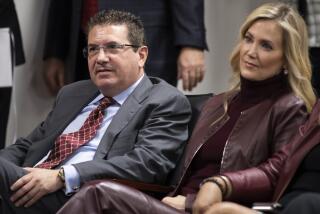Sears Said Close to Selling Unit of Coldwell Banker
- Share via
The Coldwell Banker Commercial Real Estate Group, put up for sale in October by Sears, Roebuck & Co., is on the verge of being bought by a group of investors including the firm’s management and a Washington investment group headed by former Defense Secretary Frank C. Carlucci, according to reliable sources.
Among other investors in the purchasing group, sources said, is the Hillman family of Pittsburgh. The real estate empire of billionaire Henry L. Hillman, one of the nation’s richest men, agreed last November to pay $200 million cash for Unocal headquarters and a 13-acre section of vacant land west of the Harbor Freeway in downtown Los Angeles.
Part of the financial backing for the group’s purchase of the Los Angeles-based unit is believed to be from a Japanese bank, which sources in the real estate industry speculated was Sumitomo.
As part of the deal, details of which were still being pounded out late Monday, the commercial group would be required to change its name after an interim period. Sears would continue to use Coldwell Banker for the residential unit, which the retailer is retaining.
Since Sears put the commercial unit on the block Oct. 31 as part of a corporate overhaul designed to buoy the retailer’s bottom line, there has been considerable interest from a number of investor groups and real estate companies, both foreign and domestic, according to real estate sources.
The sale by Sears would break up the nation’s largest full-service real estate brokerage--a firm that was among the first to staff nationwide offices in a business that had been conducted primarily by regional companies.
The commercial unit, which has 99 offices and about 5,200 employees in the United States and Canada, accounted for about one-third of Coldwell Banker’s $1.24 billion in 1987 revenues.
Didion Would Keep Post
James J. Didion, chairman of the Coldwell Banker commercial unit, is expected to remain in his post after the purchase goes through. He had pledged that the unit’s management would play a key role in the ultimate ownership. Sources did not know how big a stake management would hold.
The investors, known as Carlyle Group, started in May, 1987. The group numbers among its executives a senior adviser, Frederic V. Malek, a former White House aide to Richard M. Nixon who became a top executive of the Marriott hotel company. Among the firm’s four managing directors are David Rubenstein, who served as deputy domestic policy adviser in the Carter Administration; Steve Norris and Dan D’Aniello, two former senior executives at Marriott, and William Conway, former chief financial officer of MCI, the telecommunications company.
Carlucci, Carlyle’s vice chairman, had a long career in government, including a stint as Defense secretary in the Reagan Administration. He also served briefly as chairman and chief executive of Sears World Trade Corp., a unit of Chicago-based Sears that was dissolved after an ill-fated attempt in the early 1980s to become a major global trading arm for the retailer.
Last month, Carlyle said it was re-evaluating its $230-million bid for Fairchild Industries after Fairchild was sued on allegations that a Chatsworth subsidiary falsified test results on nuts, bolts and rivets used in military and commercial aircraft.
The Hillman group has been buying California real estate since the mid-1970s. Hillman’s fortune was estimated at $2.5 billion by Forbes magazine, which ranked him No. 5 on its most recent list of wealthiest Americans.
Benefit From Disruptions
Although some Coldwell Banker employees expressed relief that a deal at last seems imminent, real estate sources noted that the uncertainty of the last few months has taken its toll. A few high-ranking Coldwell Banker officials have defected to other firms in recent weeks.
And competitors are expected to make the most of disruptions from the sale. Micheal S. Geller, vice president of Julien J. Studley Inc., another commercial real estate company in Los Angeles, said a sale of a strong rival such as Coldwell Banker “creates opportunities in our industry.”
When Sears bought Coldwell Banker in 1981, its interest was primarily in the company’s residential practice. At the time, Sears was busy putting under its corporate umbrella an array of services, including the Dean Witter stock brokerage, that it hoped would complement its Sears stores and Allstate Insurance unit.
The idea was that customers would buy stocks and, occasionally, even houses where they bought socks. But the commercial real estate division--which offers industrial, retail and office clients a full range of services from appraisal to leasing to financing to capital management--did not blend as well with the rest of the company.
As a result, when Sears last October announced a renewed focus on its core merchandising business, observers were not surprised that the Coldwell Banker commercial unit went on the block. Sears also announced that it was putting up for sale its landmark Sears Tower headquarters building.
More to Read
Inside the business of entertainment
The Wide Shot brings you news, analysis and insights on everything from streaming wars to production — and what it all means for the future.
You may occasionally receive promotional content from the Los Angeles Times.











